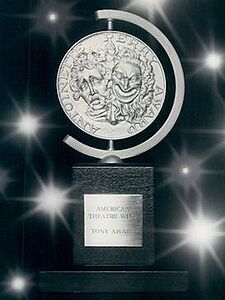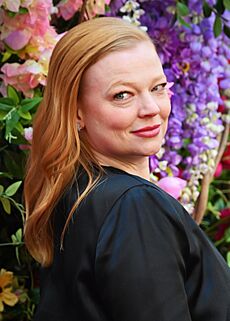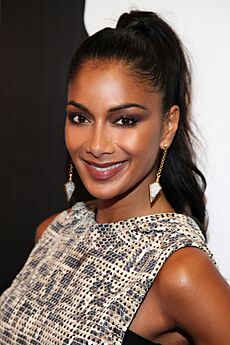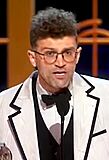Tony Awards facts for kids
The Tony Award is a very important prize in American theater. It's officially called the Antoinette Perry Award for Excellence in Broadway Theatre. These awards celebrate the best live shows on Broadway. Broadway shows are plays and musicals performed in special theaters in New York City.
The American Theatre Wing and The Broadway League present the awards. They hold a big ceremony every year in Manhattan, usually in June. Tony Awards are given for Broadway plays and musicals. They also give an award for great regional theater. Plus, there are special awards for people who have done amazing things in theater.
A theater producer named Brock Pemberton started these awards. They are named after Antoinette Perry, who was an actress, producer, and director. She also helped start the American Theatre Wing. The award itself is a cool medallion. It spins and shows the classic comedy and tragedy masks.
The rules for the Tony Awards are very specific. They are like the Emmy Awards for TV or the Grammy Awards for music. They are also like the Academy Awards (Oscars) for movies. Someone who wins all four of these major awards is said to have won an EGOT. The Tony Awards are similar to the Laurence Olivier Awards in the United Kingdom.
Contents
Tony Award Categories
|
||||||||||||||||||||||||||||
|
||||||||||||||||||||||||||||
|
||||||||||||||||||||||||||||
There are many different categories for Tony Awards. In 2014, there were 26 main categories. The awards started with 11 categories in 1947. The names and number of awards have changed over time. For example, the "Best Book of a Musical" award used to be called "Best Author (Musical)".
A new special award was created in 2009. It's called The Isabelle Stevenson Award. This award goes to someone who has given a lot of their time. They must have volunteered for a good cause or charity.
Some award categories have been removed or changed. The "Best Special Theatrical Event" award was stopped in 2010. The "Best Sound Design" awards for plays and musicals were also stopped in 2015. However, the Sound Design Award was brought back in 2018.
Performance Awards
These awards celebrate the actors and actresses in Broadway shows.
- Best Leading Actor in a Play
- Best Leading Actress in a Play
- Best Featured Actor in a Play
- Best Featured Actress in a Play
- Best Leading Actor in a Musical
- Best Leading Actress in a Musical
- Best Featured Actor in a Musical
- Best Featured Actress in a Musical
Show and Technical Awards
These awards recognize the shows themselves and the people who work behind the scenes.
- Best Musical
- Best Revival of a Musical
- Best Direction of a Musical
- Best Book of a Musical
- Best Original Score (for music and lyrics)
- Best Orchestrations (how the music is arranged)
- Best Choreography (for dance)
- Best Scenic Design in a Musical (for sets)
- Best Costume Design in a Musical (for outfits)
- Best Lighting Design in a Musical
- Best Sound Design of a Musical
- Best Play
- Best Revival of a Play
- Best Direction of a Play
- Best Scenic Design in a Play
- Best Costume Design in a Play
- Best Lighting Design in a Play
- Best Sound Design of a Play
Special Tony Awards
These awards honor unique contributions to theater.
- Regional Theatre Tony Award
- Special Tony Award (includes Lifetime Achievement Award)
- Tony Honors for Excellence in Theatre
- Isabelle Stevenson Award
Awards That Are No Longer Given
Some Tony Award categories have been retired or changed over the years.
- Best Author
- Best Conductor and Musical Director
- Best Costume Design (now split into two awards)
- Best Lighting Design (now split into two awards)
- Best Newcomer
- Best Revival (now split into two awards)
- Best Scenic Design (now split into two awards)
- Best Stage Technician
- Best Special Theatrical Event
- Best Director (now split into two awards)
History of the Tony Awards
The Tony Awards were created in 1947. A group from the American Theatre Wing (ATW) started them. The awards are named after Antoinette Perry, who was called Tony. She was an actress, director, and producer. She also helped found the American Theatre Wing. She passed away in 1946.
The very first Tony Awards ceremony was on April 6, 1947. It was held at the Waldorf Astoria hotel in New York City. The first winners received scrolls, cigarette lighters, and jewelry. The famous Tony medallion was first given out in 1949.
Since 1967, the Tony Awards ceremony has been shown on TV across the U.S. The show often includes songs from the nominated musicals. Sometimes, it shows clips or talks about the nominated plays. The American Theatre Wing and The Broadway League work together to present the awards.
Even though fewer people watch the Tonys compared to the Oscars, it reaches a special audience. This audience is often wealthy and educated. Advertisers like this because these viewers are interested in high-quality products. In 2009, the Oscar telecast had 36.3 million viewers. The Tony Awards usually get between six and eight million viewers.
The Tony Medallion
The Tony Award medallion was designed by art director Herman Rosse. It is made mostly of brass and bronze. It has a shiny nickel coating on the outside. The medallion sits on a black base. The front of the medallion shows the famous comedy and tragedy masks.
The back of the medallion used to have a picture of Antoinette Perry. Now, it has the winner's name, the award category, the show's name, and the year. The medallion has been on a black base since 1967.
A new, larger base was introduced in 2010. This new base is taller and heavier. It is about 5 inches (12.7 cm) tall and weighs about 3.5 pounds (1.6 kg). The old base was about 3.25 inches (8.3 cm) tall and weighed 1.5 pounds (0.68 kg). This change was made to make the award feel more important. It also makes it easier for winners to hold it up.
When a Broadway show wins a Tony, the author and up to two producers get a free award. Other producers on the team can buy their own awards. The money from these sales helps pay for the Tony Awards ceremony. An award cost $400 in 2000. By 2009, it was $750. Since 2013, it has been $2,500.
How Tony Awards Work
The Tony Awards have specific rules for how shows qualify.
Rules for New Shows
A "new" play or musical is one that has never been on Broadway before. It also cannot be a "classic" or a very well-known show. The Tony Awards committee decides if a show is a classic. Shows that move from Off-Broadway or London's West End can be considered "new." Shows based on movies can also be "new."
Sometimes, these rules cause discussions. Some shows have been told they can't be in the "new" category. This means their writers couldn't win awards like Best Play or Best Musical. Others think that allowing older, well-known shows to be "new" gives them an unfair advantage. This is because they have had more time to develop.
Committees and Voters
The Tony Awards Administration Committee has 24 members. They decide which shows and people are eligible for awards.
The Tony Awards Nominating Committee chooses the nominees for each category. This group changes every three years. They are theater experts who watch every new Broadway show. In 2014, this committee had 50 members.
About 868 people can vote for the Tony Awards. This number changes a little each year. In 2009, first-night critics were not allowed to vote. But this decision was changed. Members of the New York Drama Critics' Circle were invited to vote again starting in 2010.
The voters include people from various theater groups. These include the American Theatre Wing, Actors' Equity Association, and The Broadway League.
Eligibility Dates
To be considered for a Tony Award, a show must have officially opened on Broadway by a certain date. This date is set each year by the Management Committee. For example, for the 2013–2014 season, the deadline was April 24, 2014.
In 2020, the 74th Tony Awards were delayed because of the COVID-19 pandemic. It was later announced that the awards would take place online.
Broadway Theaters
A Broadway theater must have 500 or more seats. The Tony Awards Administration Committee decides which theaters are considered "Broadway theaters." As of 2016, there were 41 such theaters. Most are near Times Square in New York City. One is the Lincoln Center's Vivian Beaumont Theater.
Images for kids
See also
 In Spanish: Premios Tony para niños
In Spanish: Premios Tony para niños
- Drama Desk Award
- Helpmann Awards
- Laurence Olivier Awards
- List of Tony Awards ceremonies
- List of Tony Award-nominated productions
- Obie Award
- Theatre World Award
 | Jackie Robinson |
 | Jack Johnson |
 | Althea Gibson |
 | Arthur Ashe |
 | Muhammad Ali |














